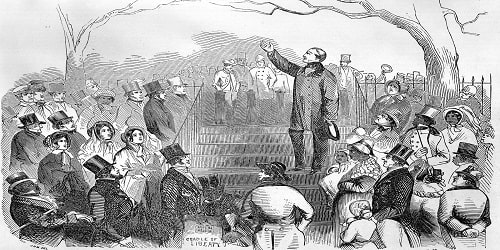Abolitionism
The term abolition refers to the action of putting an end to a law. However, the concept of abolitionism is associated with a very specific phenomenon: slavery. Therefore, it is essential to differentiate and distinguish them, and it is common to confuse them as a result of the grammatical and auditory connection.
The liberal ideas that emerged from the French Revolution were decisive for the abolition of slavery in the Western world.
In the context of the ancient world, there was a clear distinction between two types of men: the free and the slaves. The former had recognized rights and the latter were men and women who formed a workforce and lacked most of the rights of citizens.
As a general rule, slaves lived in a very precarious situation and were subject to the will of their masters. In some historical contexts, for example the classical Greek era, the figure of the slave had a certain social recognition (for example, the first pedagogues were slaves).
The term slave has received other related names, such as servant or vassal. In the case of women, the sexual slaves were the concubines. Regardless of the word used, every person who is in the service of another lives in a situation of slavery.
After the French Revolution of 1789, a text of great historical relevance was published, the “Declaration of the Rights of Man and of the Citizen .” In the first article it is stated that “men are born and remain free and equal in rights.”
This principle was the decisive advance for the gradual abolition of slavery in countries such as the United States, Spain, Russia, the United Kingdom, and Portugal.
Although abolition was formally imposed, in practice there are still people in slavery.
Anti-abolitionism
Abolitionist movements defended their theses for humanitarian reasons and because slavery represented a degradation of human dignity. Another of the arguments put forward was economic since it was considered that a free man is more productive than a slave.
Some leaders and intellectuals opposed this reform. The anti-abolitionists had their own arguments:
1) there are men who cannot be free because they were born to serve the powerful,
2) the economic system can only function effectively if there is a large volume of slave workers and
3) not all slaves want to be freed, because with their release they lose the protection and security that the master provides them.
Abolitionism Meaning in Hindi
उन्मूलन शब्द का अर्थ किसी कानून को समाप्त करने की क्रिया से है। हालाँकि, उन्मूलनवाद की अवधारणा एक बहुत ही विशिष्ट घटना से जुड़ी है: गुलामी। इसलिए, उन्हें अलग करना और पहचानना आवश्यक है, और व्याकरणिक और श्रवण संबंध के परिणामस्वरूप उन्हें भ्रमित करना आम बात है।
फ्रांसीसी क्रांति से उभरे उदार विचार पश्चिमी दुनिया में गुलामी के उन्मूलन के लिए निर्णायक थे।
प्राचीन दुनिया के संदर्भ में दो प्रकार के पुरुषों के बीच स्पष्ट अंतर था: स्वतंत्र और दास। पूर्व के पास मान्यता प्राप्त अधिकार थे और बाद वाले पुरुष और महिलाएँ थे जो एक कार्यबल का गठन करते थे और उनके पास नागरिकों के अधिकांश अधिकार नहीं थे।
एक सामान्य नियम के रूप में, दास बहुत ही अनिश्चित स्थिति में रहते थे और अपने स्वामियों की इच्छा के अधीन होते थे। कुछ ऐतिहासिक संदर्भों में, उदाहरण के लिए शास्त्रीय ग्रीक युग में, दास की छवि को एक निश्चित सामाजिक मान्यता प्राप्त थी (उदाहरण के लिए, पहले शिक्षक दास थे)।
दास शब्द को अन्य संबंधित नाम मिले हैं, जैसे कि नौकर या जागीरदार। महिलाओं के मामले में, यौन दासियाँ रखैलें थीं। इस्तेमाल किए गए शब्द के बावजूद, हर व्यक्ति जो दूसरे की सेवा में है, गुलामी की स्थिति में रहता है।
1789 की फ्रांसीसी क्रांति के बाद, ऐतिहासिक रूप से प्रासंगिक एक पाठ प्रकाशित हुआ, “मनुष्य और नागरिक के अधिकारों की घोषणा।” पहले लेख में कहा गया है कि “पुरुष स्वतंत्र और समान अधिकारों के साथ जन्म लेते हैं और रहते हैं।”
यह सिद्धांत संयुक्त राज्य अमेरिका, स्पेन, रूस, यूनाइटेड किंगडम और पुर्तगाल जैसे देशों में दासता के क्रमिक उन्मूलन के लिए निर्णायक प्रगति थी।
हालांकि उन्मूलन औपचारिक रूप से लागू किया गया था, व्यवहार में अभी भी लोग गुलामी में हैं।
उन्मूलन विरोधी
उन्मूलनवादी आंदोलनों ने मानवीय कारणों से अपने सिद्धांतों का बचाव किया और क्योंकि गुलामी मानव गरिमा के ह्रास का प्रतिनिधित्व करती थी। आगे रखे गए तर्कों में से एक आर्थिक था क्योंकि यह माना जाता था कि एक स्वतंत्र व्यक्ति एक गुलाम की तुलना में अधिक उत्पादक होता है।
कुछ नेताओं और बुद्धिजीवियों ने इस सुधार का विरोध किया। उन्मूलन विरोधियों के अपने तर्क थे:
1) ऐसे लोग हैं जो स्वतंत्र नहीं हो सकते क्योंकि वे शक्तिशाली लोगों की सेवा करने के लिए पैदा हुए हैं,
2) आर्थिक व्यवस्था तभी प्रभावी ढंग से काम कर सकती है जब दास श्रमिकों की संख्या बड़ी हो और
3) सभी दास मुक्त नहीं होना चाहते, क्योंकि उनकी रिहाई के साथ ही वे वह सुरक्षा और संरक्षण खो देते हैं जो मालिक उन्हें प्रदान करता है।
